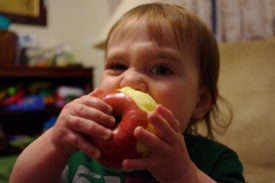Because it’s starting to freak me out a little.
The unprecedented honeybee die-off, that is:
…if the collapse worsens, we could end up being “stuck with grains and water,” said Kevin Hackett, the national program leader for USDA’s bee and pollination program.
“This is the biggest general threat to our food supply,” Hackett said.
Why? Because:
…about one-third of the human diet comes from insect-pollinated plants, and the honeybee is responsible for 80 percent of that pollination…
The backstory:
U.S. beekeepers in the past few months have lost one-quarter of their colonies – or about five times the normal winter losses…. The problem started in November and seems to have spread to 27 states, with similar collapses reported in Brazil, Canada and parts of Europe.
Even before this disorder struck, America’s honeybees were in trouble.
Luckily, it should be easy to solve:
The top suspects are a parasite, an unknown virus, some kind of bacteria, pesticides, or a one-two combination of the top four, with one weakening the honeybee and the second killing it.








Alan Durning
It’s a little freaky, yeah.I heard an NPR report on this a couple of days ago, Eric. Tom Banse did the report, I think, if you want to search for it.It mentioned that, so far, the honeybee die off hasn’t hit the Northwest. So that’s something.
MichelleV.P.
Further on Northwest honeybees:I found this article in The Register-Guard a few weeks ago, to be very reassuring. Apparently, ‘…Oregon honeybees…are more robust this year than they have been in years or even decades, local beekeepers say.’The article is definitely worth a read, and helps to put this issue in perspective.
Jon Stahl
Whenever reality gets weirder than the background details in a William Gibson novel, it sends a little frission up my spine. This did that.